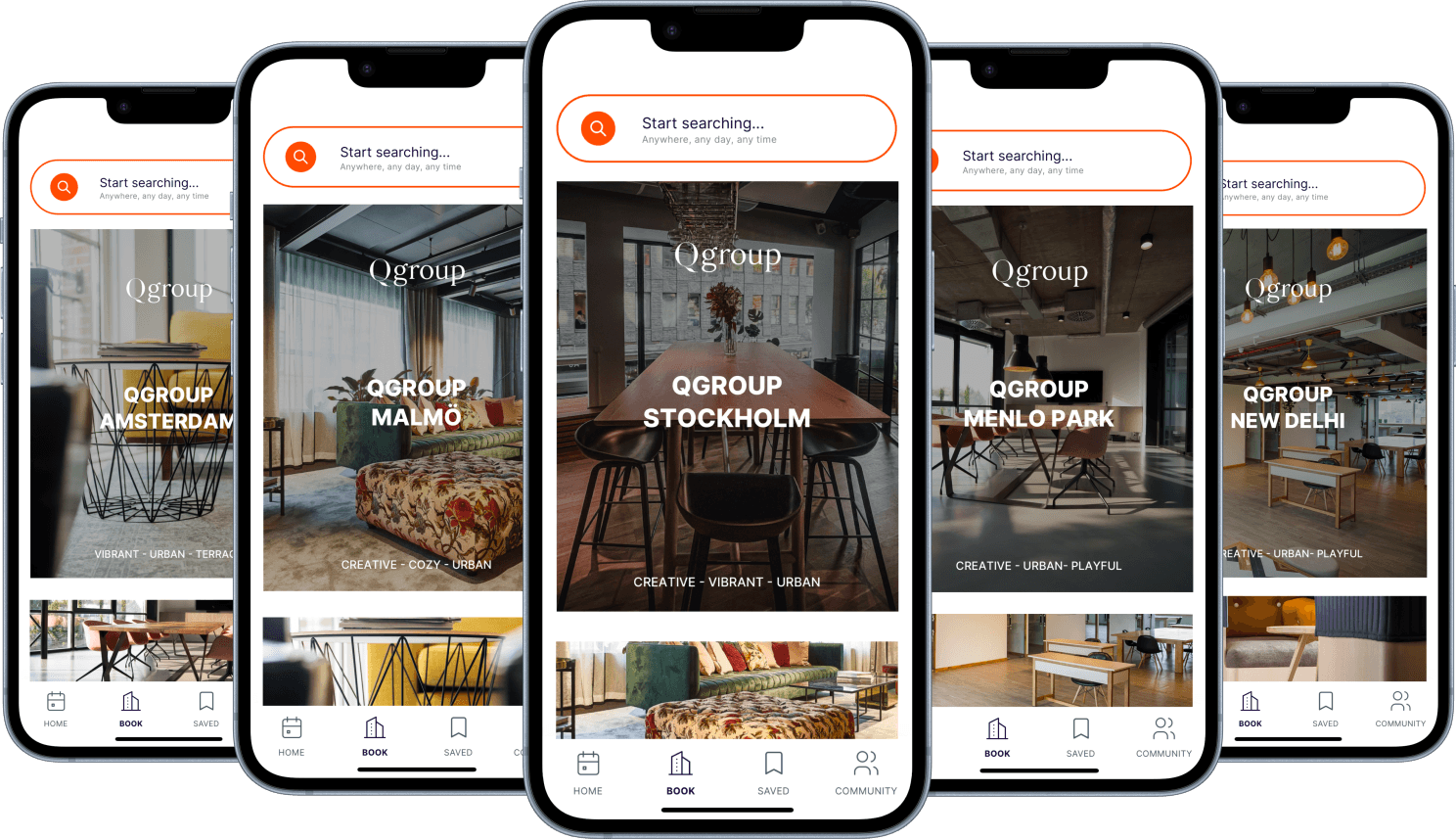The networked office by QGroup

customer story
5 juli 2023
Enter Flowpass, a game-changer that introduced QGroup to the possibilities of a fluid, dynamic workspace. By opting for a compact, centrally located office and supplementing it with a network of coworking hubs, QGroup embraced a model that balances flexibility with functionality.
Established in 2012 in Malmö, Sweden, QGroup has quickly grown into a formidable conglomerate of IT consulting firms. Known for its innovative approaches, Qgroup challenged traditional norms in developing and rapidly expanding its influence across 19 cities with over 800 professionals, highly specialised consultants, and 36 companies under its umbrella. Last year, they integrated the 50-person-strong Stockholm-based Dynabyte. Their dynamic growth trajectory set the stage for a unique operational and facilities management challenge, the outcome of which we would like to share.
The Challenge: Diverse Needs, One Umbrella
Managing a diverse group of IT firms, each a leader in its niche, Qgroup faced the challenge of unifying its operations without compromising its strengths. The traditional office model needs to be improved for its expansive and varied needs in size, cost, and functionality.
"We were dealing with a mosaic of different brands, office spaces, cultures, and work environments. Streamlining them and making everyone feel integrated into the larger QGroup family was a massive task. Says Anders Lentell, founder of Dynabyte."
Embracing Flexibility with Flowpass
The partnership with Flowpass marked a significant shift in Qgroup's thoughts about what a future office could deliver. Instead of settling for a large conventional office outside Stockholm, they opted for a smaller, centrally located "flagship" office hub. They then added a network of on-demand capacity using coworking hubs distributed in hand-picked areas in the city and suburbs where employees can book day passes and meeting rooms when needed.
Adding extra capacity through on-demand access gives QGroup the advantage of paying only for the office space they use. It also gives employees more options for choosing where to work for a day.
QGroup uses the Flowpass workplace app to unify its flexible network of locations, enabling sharing and resource utilisation and maximising social networking/community building by having everyone book where they will work from using the app. They can manage policies and accesses in the backend/admin interface. Here, QGroup can also easily spin up more coworking hubs where they need them or add more offices to share resources among employees.
Qgroup is a brand that prioritises innovation and values individual growth. They have even coined a term for their model called the "Q Way". To maintain consistency in the workplace experience, we aim to create an "Office Universe" unique to Qgroup, regardless of the location. We strive to foster a sense of belonging and shared office philosophy among coworkers, focusing on exclusivity and unity.

Q&A with Anders Lentell, founder of Dynabyte (now part of Qgroup)
Question: How would you describe the ease of integrating Flowpass into Qgroup's operations?
Flowpass integration was smooth and intuitive, but what stood out was their attention to detail and their engagement in tailoring it to our needs. The software is designed with the end-user in mind. It didn't take long for our administrative and on-the-ground teams to get the hang of it and make the most of its capabilities, says Anders in a reassuring tone.
Flowpass also integrated a digital key system, Accessy, into our flagship office hub. The individual key is in the workplace app, so everyone can enter various office spaces without thinking about it too much, as access rights and security are integrated into the solution.
Q: You now have fewer meeting rooms and desks than the original plan. How does that work out?
We put unique QR codes in the meeting rooms instead of installing expensive hardware. We wanted to change our habits regarding how we reserve meeting space. If someone wants to spend a couple of hours or a whole day working from our QHub in Stockholm, they book a day pass well in advance.
We are adding access to coworking arenas that fit our needs and operate a premium service. We can add and withdraw them without any lengthy subscriptions to worry about. In some cases, we will be able to Add brand space accordingly.
Q: What was people's reaction to a smaller flagship office where not everyone can always fit in?
We advocate that our people choose not to come into the office at all times but rather sit with our clients or in a coworking space that suits the team or is handy for a particular assignment. This is considered an upgrade from before. My colleagues appreciate this model's flexibility, the trust we show each other, and the possibility of having a great office environment when needed to meet and socialise.
Q: Any disappointments or challenges you would like to share?
The Flowpass app has allowed us to book spaces and collaborate better, fostering a flexible and digital-first workplace. With the Flowpass community booking function, we can coordinate and plan our collaboration better.
Of course, this is a work in progress; not everything turns out as we thought. We see Flowpass as a great learning experience so we can better guide clients to a future-oriented way of working. In the future, more companies will have to use and adapt technology to optimise the use of office space. I doubt there is a better solution out there now, and we get to try it firsthand.
This solution has proven cost-effective and enabled data-driven decisions for future office space planning.